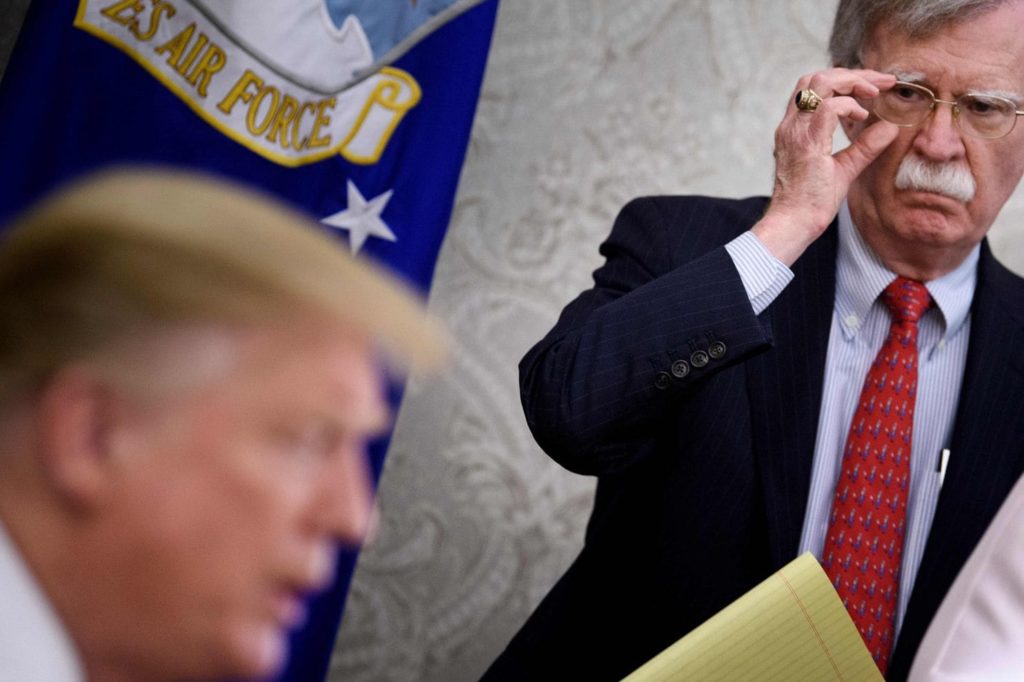The Trump administration accelerated the deployment of an aircraft carrier to the Middle East and announced the deployment of bombers and other military assets in response to what it said were Iranian threats to the U.S. and its allies. Tensions between the U.S. and the Islamic Republic have been rising since Trump took office, highlighted by the administration’s decision last year to withdraw from the 2015 nuclear accord between Iran and world powers and to reinstate sanctions that have crippled the Iranian economy. Here’s a look at where the escalating crisis stands:
THE THREAT
National security adviser John Bolton announced on May 5 that the USS Abraham Lincoln Carrier Strike Group would be rushed from the Mediterranean to the Persian Gulf ahead of schedule in response to “a number of troubling and escalatory indications and warnings,” without going into details.
A U.S. official, speaking on condition of anonymity, soon after told The Associated Press that Bolton’s announcement was based in part on intelligence indications that Iran had moved short-range ballistic missiles by boat in waters off its shores.
Another official later told AP that the U.S. has intelligence that Iranians have loaded military equipment and missiles onto small boats, controlled by Iran’s Revolutionary Guard, within their country’s territorial waters, possibly in preparation for attacks on vessels in the area. That official also said there have been threats by Iranian proxy forces, which operate in several countries throughout the region, including Iraq and Syria.
WHAT’S HAPPENED
Four oil tankers, including two belonging to Saudi Arabia, were targeted Sunday in an apparent act of sabotage off the coast of the United Arab Emirates port of Fujairah, according to officials in the region. Gulf officials have not said who they suspect was responsible and details remain elusive. U.S. officials, speaking on condition of anonymity, say an investigative team sent to UAE believes that large holes in ships anchored offshore were caused by explosive charges, and they believe the damage was done by Iranian military divers. No evidence has been publicly produced.
An oil pipeline that runs across Saudi Arabia was hit Tuesday by drones in an attack claimed by the Iranian-backed Houthis in Yemen. The pipeline that runs from the kingdom’s oil-rich Eastern Province to a Red Sea port was shut down, but Saudi Energy Minister Khalid al-Falih vowed that the production and export of Saudi oil would not be interrupted.
THE REACTION
U.S. Secretary of State Mike Pompeo made a quick, unexpected trip to Iraq to discuss the intelligence with Iraqi leaders.
The U.S. has ordered all nonessential government staff to leave Iraq.
In addition to the carrier and bombers, the U.S. is moving a Patriot missile battery to an undisclosed country in the area and is dispatching the amphibious transport ship the USS Arlington, which has more Marines on board and more sophisticated capabilities than the ship it will replace. U.S. military fighter jets have been flying around the region in a show of force.
Germany and the Netherlands both suspended their military assistance programs in Iraq in the latest sign of tensions sweeping the Persian Gulf region over still-unspecified threats that the Trump administration says are linked to Iran.
But there have also been signs of international wariness about the escalating situation. A senior British officer in the U.S.-backed coalition fighting the Islamic State group told reporters he has seen no increased threat from Iranian-backed forces in Iraq and Syria. But hours later the U.S. military rebutted his statement, saying the threat level has been heightened in Iraq due to credible intelligence about potential attacks.
British Foreign Secretary Jeremy Hunt warned that the heated rhetoric could lead to an “accidental” war between the U.S. and Iran. The remarks brought Britain closely into line with other European nations that want a focus on diplomacy, not escalation. Europe wants to salvage the 2015 nuclear containment deal with Iran, not ratchet up tensions.
(AP)












2 Responses
Things sound serious. Just why did Gene Simmons deliver a Pentagon briefing? (The first in a very long time.)
So far not a word to Congress, what is the administration waiting for?